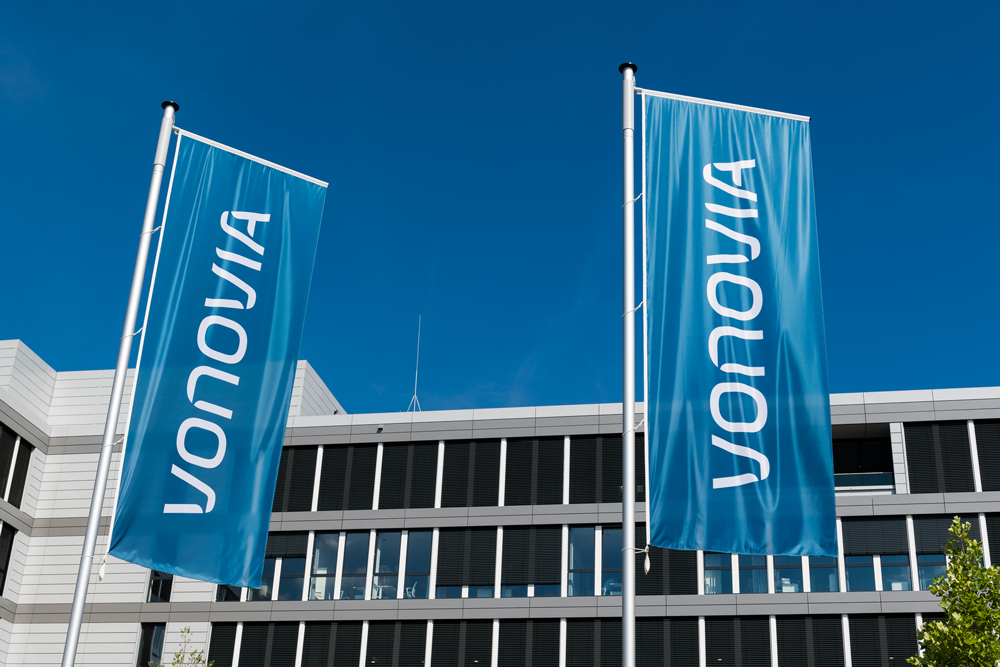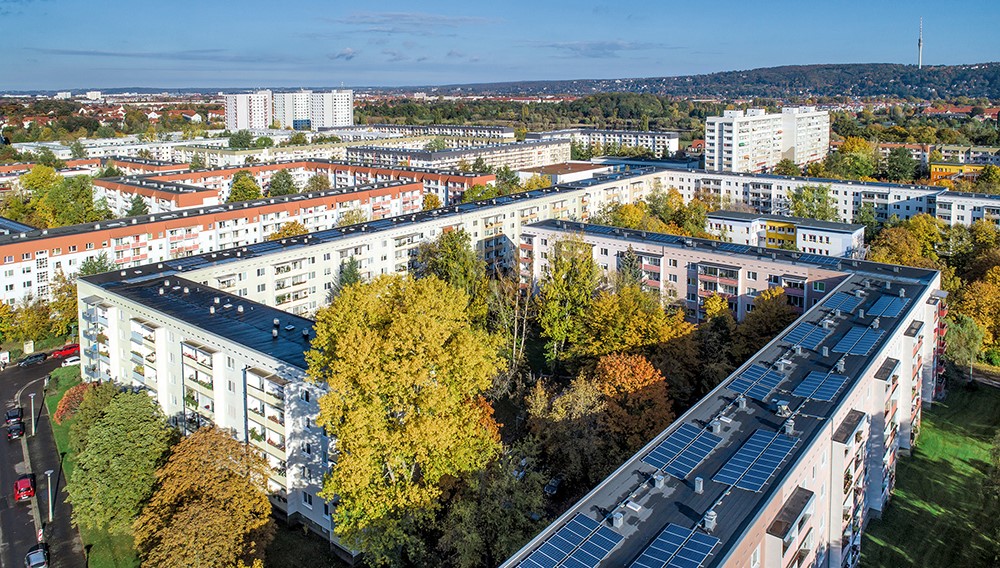Employee Issues
Within the context of the statutory requirements in the Non-financial Group Declaration, employee issues include the following material topics: “Appeal as an employer” and “Approach to diversity and equal opportunities” (see materiality matrix). The Group guidelines of Vonovia are definitive in terms of describing the concepts and their implementation. As part of the pending integration of the company Deutsche Wohnen acquired by us, these guidelines, concepts and processes will also be transfered to the acquired business activities. Unless stated otherwise, the concepts presented for the reporting year apply to the Vonovia Group excluding Deutsche Wohnen.
Appeal as an Employer
Working life and organization were once again largely dominated by the coronavirus pandemic in 2021. Whereas there was a need in the previous year to respond quickly to changing circumstances with flexible working models and employee protection measures, 2021 was shaped by the consolidation and further development of the transformation to flexible and digitalized processes.
The works agreement on mobile working, negotiated between senior management and the works council, remains in place. A corresponding agreement now also exists for Austrian employees. In numerous departments and service areas, it was possible to institute hybrid working models combining on-site working and mobile working.
The company’s HR processes support this flexibility through further digitalization of processes. Whereas elements such as the reporting of absences due to illness via an app or the digital recording of working hours in many divisions eased location-independent working in the previous year, 2021 saw the digitalization of further HR processes. This applies, in particular, for the areas of training and talent management, where further IT applications were implemented within Success Factors, making them available for more than 90% of the Group (excluding Deutsche Wohnen). For example, seminars on data protection and the Code of Conduct were held by means of specially developed online formats. All talent processes are now assisted by software, simplifying both executive development and succession planning processes.
The (ongoing) development of existing employees is particularly important for the company, whether in Germany, Austria or Sweden. Needs-based training courses and programs include training sessions and specialist seminars, management development courses and certified qualification schemes. We support the further development of our high-potential candidates through our own Vonovia Academy and our cooperation projects with EBZ Business School in Bochum, which focuses on property management, and other educational institutions. In Austria, we reinstituted the apprentice program in 2021. Here, the first four young people have started their apprenticeships at the Vonovia subsidiary BUWOG.
By virtue of the insourcing of numerous tasks along the value chain – from caretaker work and garden maintenance through to the carrying out of maintenance services – and the resulting large number of employees in skilled trade and technical positions, Vonovia is combating the risk of a skills shortage on this labor market by taking a holistic approach to HR planning: targeted recruiting is complemented by ongoing training and education, talent promotion and extensive social benefits to promote employee loyalty. For example, we are continuing with the harmonization of various company social benefits and employee programs, e.g., by introducing a new employee retirement benefit plan and the leasing of company bikes. Both of these benefits are available to all Vonovia employees in Germany.
In 2021, a new recruitment campaign was launched in order to persuade more people to join Vonovia in skilled trade occupations. Under the title “Hand aufs Werk” this new campaign was launched in 42 German cities through myriad media channels. A total of 1,600 new applications were received during the campaign period (10 weeks) – roughly 65% more than in the comparison period before the campaign.
All these measures are designed to position Vonovia as an attractive, reliable and secure employer. After all, we need well-trained, qualified employees to achieve our mission and pursue our growth strategy. In 2021, there were once again no pandemic-related operational terminations, and there was also no need to introduce short-time work.
The exclusion of operational terminations also applies with respect to the integration process of Deutsche Wohnen SE. Employees of Deutsche Wohnen SE are protected against operational terminations due to the integration process until the end of 2023.
Vonovia is committed to the core labor standards of the International Labour Organization (ILO) in all areas, particularly with regard to freedom and rights of association. Works councils represent all Vonovia employees in Germany and Austria.
Employee Key Figures
Employee Key Figures | |||||||
Category | Unit | 2020*** | 2021 | ||||
Total number of employees* | number | 10,622 | 12,088 | ||||
of which female | number | 2,626 | 3,414 | ||||
of which permanent | number | 9,669 | 11,137 | ||||
Nationalities** | number | 76 | 74 | ||||
Average age (total) | years | 42.5 | 42.8 | ||||
People with disabilities** | number | 368 | 344 | ||||
Total number of trainees** | number | 510 | 561 | ||||
of which commercial | number | 153 | 185 | ||||
of which technical trade | number | 357 | 376 | ||||
Training rate** | % | 5.0 | 4.6 | ||||
- *Total number of employees by headcount, from 2021 all key figures including Deutsche Wohnen (excluding Care and Assisted Living). The Care and Assisted Living business activity of Deutsche Wohnen SE comprises a further 3,783 employees (see also section Social concerns: needs-based living and action in relation to demographic change).
- **Not including Sweden. Germany and Austria taken into account.
- ***Excluding Deutsche Wohnen.
The satisfaction of our employees is a decisive indicator for allowing us to assess our appeal as an employer. In 2021, we conducted a comprehensive survey of employees in Germany, Austria and Switzerland via an external contractor. As such, it was possible to expand on the most recent survey of the entire Group (excluding Deutsche Wohnen), which was conducted in 2019. The survey contains questions on five dimensions that are of particular importance for our company: credibility, respect, fairness, pride and team spirit.
The results of the employee survey bolster the success of the measures taken in the previous year. The Group-wide response rate increased from 72% in 2019 (excluding Sweden) to 82% in 2021. Changes in the employee satisfaction level – which this year became a component of the Group’s key non-financial performance indicator (SPI) – will offer a regular indication of the degree to which Vonovia is an attractive employer. With this in mind, it is planned to repeat the employee satisfaction survey each year.
Material Performance Indicator – Increase employee satisfaction
Material performance indicator – SPI | ||||||||
Category | Unit | 2020 | 2021 | Target for 2022 | ||||
Increase employee satisfaction* | percentage points | –** | +5*** | Same level as the previous year | ||||
- *Conducted Group-wide for the first time in 2021; in each case excluding Deutsche Wohnen.
- **No survey conducted in 2020, therefore no change compared with previous year.
- ***In relation to the 2019 survey (the time comparison includes Germany and Austria, Sweden did not participate in 2019).
Deutsche Wohnen also conducts surveys to measure employee satisfaction. While the questionnaires fundamentally cover the same ground, they do exhibit different areas of focus. To support comparability with the changes in the employee satisfaction level of Vonovia, the percentage change in the employee satisfaction level at Deutsche Wohnen is reported here. In 2021, this was -2%. This figure already includes integration effects, as the survey was not carried out until after placement of the successful takeover offer. Employees of the Care and Assisted Living business area were not surveyed. Once integration has been completed, employee satisfaction will be measured company-wide.
Another key performance indicator examined by the employee survey is the extent to which employees are satisfied with Vonovia’s management of the pandemic so far. Here, 82% of employees stated that they were very satisfied.
Approach to Diversity and Equal Opportunities
Vonovia’s tenants and employees are as diverse as society as a whole. For example, tenants from more than 150 nations rent their homes from Vonovia, with the company itself employing people from more than 70 countries. They represent many different age groups, religions and worldviews, have a variety of physical disabilities and live their lives with a range of gender identities and sexual orientations.
We regard this diversity as a great strength and opportunity, which we support in a targeted manner and whose competitive advantage we aim to harness. By the same token, we regard not being able to meet diversity expectations as a risk for the company, which is why we have included it in our risk catalog. We currently measure this risk as having a low amount of loss and a very low probability of occurrence (<5%).
Even though we conclude from this figure that we have already achieved considerable equality of opportunity and that we embrace and promote diversity within the company, we continuously institute further measures in this context and/or adapt existing measures to reflect changes in underlying conditions. For example, we are updating our seminars on discriminatory behavior and continue to focus more closely on the integration of foreign skilled workers and displaced persons, as well as a high degree of flexibility in working hours so that all employees can structure their working time to suit their current phase in life. The gradual harmonization of social benefits also aims to ensure corresponding equal rights for all employees. For example, our employee share program and a works agreement on mobile working are now also in place in Austria.
We see the strengthening of women in the company as a special mission, as they – chiefly due to the technical occupations in the field of skilled trades – are considerably underrepresented with a share of 28.2% of the workforce as a whole. The SPI indicator “Proportion of women in leadership roles in the first and second level below the Management Board” clearly illustrates that we take care to proactively promote women and give them opportunities to pursue leadership positions and technical occupations. When setting the target – 29% by 2024 – we were guided by the representation of women in the Group as a whole. In Austria, we were not only awarded the equalitA certification for the internal promotion of women, but also with state certification as a family-friendly company.
Material Performance Indicator – Proportion of women in management positions (first and second levels below the Management Board)
Material performance indicator – SPI | ||||||||||||
Vonovia | ||||||||||||
Category | Unit | 2021 | 2022 | Target for 2022 | Deutsche Wohnen 2021 | |||||||
Proportion of women in management positions (first and second levels below the Management Board) | % | 25.9* | 28.0* | Same level as the previous year** | 30.2*** | |||||||
- *Excluding Deutsche Wohnen.
- **Related to the previous year.
- ***Deutsche Wohnen without Care and Assisted Living business activity.
At the top level of management, the diversity concept for the composition of the management and control bodies is set out in detail in the Corporate Governance Declaration.
Establishment in the Company
At Vonovia, the CEO is responsible for the company’s human resources work, which has been established centrally as a shared service within HR management. In 2021, the shared services approach was transformed into an HR business partner model, which is further developed on an ongoing basis.
Austria and Sweden have their own HR departments. Austria reports to the HR department in Germany via dotted-line reporting, whereas Sweden is still not firmly established in the reporting line. Here, monitoring and reporting takes place as and when required. Organizational integration of Deutsche Wohnen is scheduled for January 1, 2023.
The Head of HR discusses developments with the CEO on a regular basis. The objectives and focus of HR work are developed in collaboration with the Management Board and are then cascaded down throughout the organization.



